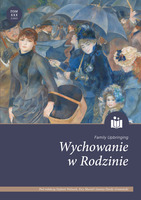Jak ludzie dorośli myślą o problemach związanych z gotowością szkolną dzieci?
How do adults think about problems related to children’s readiness for starting school?
Author(s): Paulina MichalskaSubject(s): Social Sciences
Published by: Zakład Historii Edukacji w Instytucie Pedagogiki Uniwersytetu Wrocławskiego
Keywords: gotowość szkolna dzieci; rozumowanie postformalne; dylematy; rozwiązywanie problemów; doświadczenie życiowe
Summary/Abstract: Introduction. In adulthood, post-formal ways of reasoning become more important, because the formal-logical ones do not provide adaptation in solving life-related problems (Gurba, 1993). These problems are mainly related to the functioning of family life and relate to experiencing developmental crises related to changes taking place in the family. One of such important moments in the life of a family is the time when a child starts school education (Chojak, 2019) because the current rhythm of the day is modified (Czub, Matejczuk, 2014) and the entire family system changes (Skrzetuska, 2016). Aim. The main aim of the research was to determine the post-formal ways of reasoning used by adults when solving problems related to children’s preparedness for school. Materials and methods. The study used 8 out of 18 problems from the Questionnaire of Ways of Solving Life Problems (authors: Paulina Michalska, Anna Szymanik-Kostrzewska), which concern the situation of parents of children starting school. Results. The respondents preferred solutions to problems from the meta-system level to the greatest extent. Variables such as age, education and having children were significant for the obtained results. The importance of the content of the dilemmas for the preferred solutions was confirmed. Conclusions. The most interesting conclusion from the research is that people with children preferred meta-system solutions less often than people without children. This is not consistent with the assumption that life experience in a given area contributes to more autonomous solutions (e.g., Sebby, Papini, 1994; Michalska, 2015a). This may be because parents, in the situation of solving a dilemma, are more focused on specific solutions to the problem, and more general methods with a wide range are less often taken into account by them.
Journal: Wychowanie w Rodzinie
- Issue Year: XXX/2023
- Issue No: 2
- Page Range: 161-181
- Page Count: 21
- Language: Polish

